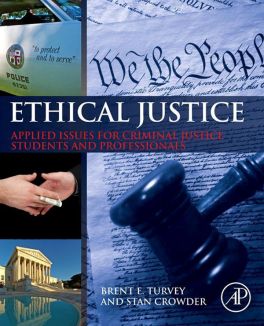Opis
This textbook was developed from an idiom shared by the authors and contributors alike: ethics and ethical challenges are generally black and white - not gray. They are akin to the pregnant woman or the gunshot victim; one cannot be a little pregnant or a little shot. Consequently, professional conduct is either ethical or it is not.
Unafraid to be the harbingers, Turvey and Crowder set forth the parameters of key ethical issues across the five pillars of the criminal justice system: law enforcement, corrections, courts, forensic science, and academia. It demonstrates how each pillar is dependent upon its professional membership, and also upon the supporting efforts of the other pillars - with respect to both character and culture.
With contributions from case-working experts across the CJ spectrum, this text reveals hard-earned insights into issues that are often absent from textbooks born out of just theory and research. Part 1 examines ethic issues in academia, with chapters on ethics for CJ students, CJ educators, and ethics in CJ research. Part 2 examines ethical issues in law enforcement, with separate chapters on law enforcement administration and criminal investigations. Part 3 examines ethical issues in the forensic services, considering the separate roles of crime lab administration and evidence examination. Part 4 examines ethical issues in the courts, with chapters discussing the prosecution, the defense, and the judiciary. Part 5 examines ethical issues in corrections, separately considering corrections staff and treatment staff in a forensic setting. The text concludes with Part 6, which examines ethical issues in a broad professional sense with respect to professional organizations and whistleblowers.
Ethical Justice: Applied Issues for Criminal Justice Students and Professionals is intended for use as a textbook at the college and university, by undergraduate students enrolled in a program related to any of the CJ professions. It is intended to guide them through the real-world issues that they will encounter in both the classroom and in the professional community. However, it can also serve as an important reference manual for the CJ professional that may work in a community that lacks ethical mentoring or leadership.
- First of its kind overview of the five pillars of criminal justice: academia, law enforcement, forensic services, courts and corrections
- Written by practicing criminal justice professionals, from across every pillar
- Offers a realistic overview of ethical issues confronted by criminals justice students and professionals
- Examines sensitive subjects often ignored in other criminal justice ethics texts
- Numerous cases examples in each chapter to facilitate instruction and learning

